The Provost’s office is pleased to lend out books of interest to faculty on the subjects of leadership, microaggressions, empathy, belonging and community within higher education amongst other topics. The books in our curated lending library are available to all faculty, and members of the mentoring cohorts are particularly encouraged to avail themselves of this resource. Please contact Orianne Smith (osmith@umbc.edu) if you are interested in checking out one of these books. And let us know too if there is a book you have found useful that we should include here!
Our Lending Library is divided into four categories: Faculty Perspectives and Advice; Leadership; Change, Connection and Difficult Conversations; and Microaggressions. Feel free to scroll through all of our offerings below or click on each category in the menu on the left.
In addition, we have partnered with the Albin O. Kuhn Library to offer a select series of books via ebook or print on Diversity, Equity, Inclusion and Accessibility in Higher Education. Click on the link on the menu on the left or here for more details.
Faculty Perspectives and Advice
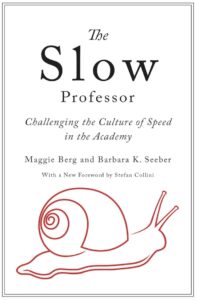
Maggie Berg and Barbara K. Seeber
If there is one sector of society that should be cultivating deep thought in itself and others, it is academia. Yet the corporatisation of the contemporary university has sped up the clock, demanding increased speed and efficiency from faculty regardless of the consequences for education and scholarship. In The Slow Professor, Maggie Berg and Barbara K. Seeber discuss how adopting the principles of the Slow movement in academic life can counter this erosion of humanistic education. Focusing on the individual faculty member and his or her own professional practice, Berg and Seeber present both an analysis of the culture of speed in the academy and ways of alleviating stress while improving teaching, research, and collegiality. The Slow Professor will be a must-read for anyone in academia concerned about the frantic pace of contemporary university life.
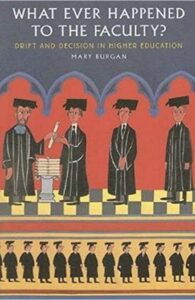
What Ever Happened to the Faculty?: Drift and Decision in Higher Education
Mary Burgen
In this provocative work, Mary Burgan surveys the deterioration of faculty influence in higher education. From campus planning, curriculum, and instructional technology to governance, pedagogy, and academic freedom, she urges far greater consideration for the perspective of the faculty. Burgan evokes the pervasive atmosphere of charge and counter-charge on U.S. campuses, where competition trumps reason not only in athletics but also in research, faculty recruitment, and fund-raising. Relating this “winner-take-all” mentality to the overspecialization of faculty and to overreliance on non-tenure track instructors, Burgan suggests that improving life on campus depends on faculty members’ successful engagement with their administrative colleagues as well as their students.
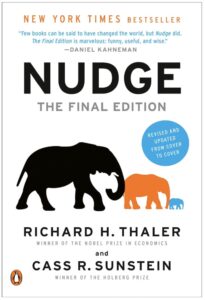
Richard H. Thaler and Cass R. Sunstein
Since the original publication of Nudge more than a decade ago, the title has entered the vocabulary of businesspeople, policy makers, engaged citizens, and consumers everywhere. The book has taught us how to use thoughtful “choice architecture”—a concept the authors invented—to help us make better decisions for ourselves, our families, and our society. This revised edition offers a wealth of new insights about a wide variety of issues that we face in our daily lives—COVID-19, health, personal finance, retirement savings, credit card debt, home mortgages, medical care, organ donation, climate change, and “sludge” (paperwork and other nuisances we don’t want, and that keep us from getting what we do want)—all while honoring one of the cardinal rules of nudging: make it fun!
Leadership
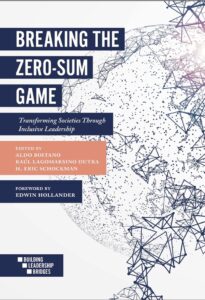
Breaking the Zero-Sum Game: Transforming Societies Through Inclusive Leadership
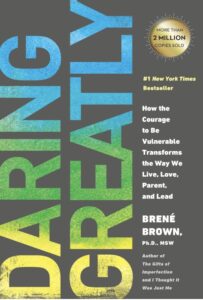
Daring Greatly: How the Courage to Be Vulnerable Transforms the Way We Live, Love, Parent, and Lead
Brené Brown
Every day we experience the uncertainty, risks, and emotional exposure that define what it means to be vulnerable or to dare greatly. Based on twelve years of pioneering research, Brené Brown PhD, MSW, dispels the cultural myth that vulnerability is weakness and argues that it is, in truth, our most accurate measure of courage. Brown explains how vulnerability is both the core of difficult emotions like fear, grief, and disappointment, and the birthplace of love, belonging, joy, empathy, innovation, and creativity. She writes: “When we shut ourselves off from vulnerability, we distance ourselves from the experiences that bring purpose and meaning to our lives.”
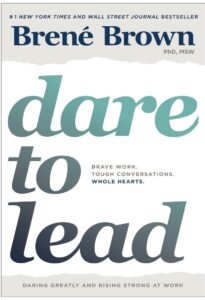
Brené Brown
When we dare to lead, we don’t pretend to have the right answers; we stay curious and ask the right questions. We don’t see power as finite and hoard it; we know that power becomes infinite when we share it with others. We don’t avoid difficult conversations and situations; we lean into vulnerability when it’s necessary to do good work. But daring leadership in a culture defined by scarcity, fear, and uncertainty requires skill-building around traits that are deeply and uniquely human. The irony is that we’re choosing not to invest in developing the hearts and minds of leaders at the exact same time as we’re scrambling to figure out what we have to offer that machines and AI can’t do better and faster. What can we do better? Empathy, connection, and courage, to start.
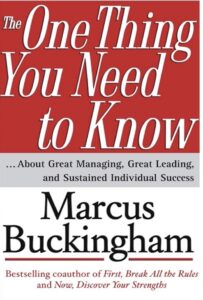
The One Thing You Need to Know: … About Great Managing, Great Leading, and Sustained Individual Success
Marcus Buckingham
Great managing, leading, and career success — Buckingham draws on a wealth of applicable examples to reveal that a controlling insight lies at the heart of the three. Lose sight of this “one thing” and even the best efforts will be diminished or compromised. As he observes, success comes to those who remain mindful of the core insight, understand all of its ramifications, and orient their decisions around it.
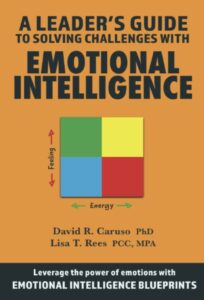
A Leader’s Guide to Solving Challenges with Emotional Intelligence
David Caruso
This guide teaches four emotional intelligence skills to acquire accurate emotional data, leverage emotions to make better decisions, understand the underlying causes of emotions and manage emotions effectively. We then address a number of specific leadership challenges and provide you with a set of blueprints to successfully address these challenges using the four emotional intelligence skills. Learn how to Map Emotions, Match Emotions, understand the Meaning of Emotions and Move Emotions. This ability model of emotional intelligence is an intelligence and these are hard—not soft—skills.
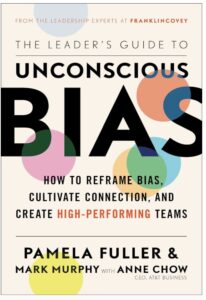
Pamela Fuller, Mark Murphy, and Anne Chow
Ideal for every manager who wants to understand and move past their own preconceived ideas, The Leader’s Guide to Unconscious Bias explains that bias is the result of mental shortcuts, our likes and dislikes, and is a natural part of the human condition. And what we assume about each other and how we interact with one another has vast effects on our organizational success—especially in the workplace. Teaching you how to overcome unconscious bias, this book provides more than thirty unique tools, such as a prep worksheet and a list of ways to reframe your unconscious thoughts.
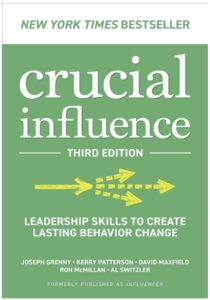
Joseph Grenny
Crucial Influence walks you through the process of identifying the personal, social, and structural levers that influence both motivation and ability, then engaging these levers for directed behavior change “At the end of the day, leadership is intentional influence,” the authors write. “If behavior isn’t changing, you aren’t leading.” Whatever you’re seeking to change through effective leadership―from making virtual workforces work to tackling a social issue―influence, not authority, is what will get you there. You’ll learn to view leadership through the new lens of influence as you apply the lessons from this book to everyday challenges.
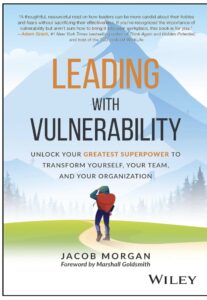
Jacob Morgan
How do some of the world’s top leaders unlock the potential of others, create trust, and lead through change? While vulnerability cripples some leaders, others tap into it and use it as a superpower. Vulnerability alone makes leaders seem incompetent. Competence on its own makes it hard for leaders to connect with their people. The key is to develop both competence and vulnerability, what Jacob calls “The Vulnerable Leader Equation.” Based on over 100 CEO interviews and a survey of nearly 14,000 employees, renowned leadership thought leader and futurist Jacob Morgan shares candid stories and original research that shows how leaders can tap into vulnerability to transform themselves, their teams, and their organizations.
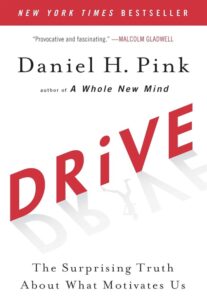
Daniel H. Pink
Most people believe that the best way to motivate is with rewards like money—the carrot-and-stick approach. That’s a mistake, according to this book. The author asserts that the secret to high performance and satisfaction-at work, at school, and at home—is the deeply human need to direct our own lives, to learn and create new things, and to do better by ourselves and our world. Drawing on four decades of scientific research on human motivation, Pink exposes the mismatch between what science knows and what business does—and how that affects every aspect of life. He examines the three elements of true motivation—autonomy, mastery, and purpose-and offers smart and surprising techniques for putting these into action in a unique book that will change how we think and transform how we live.
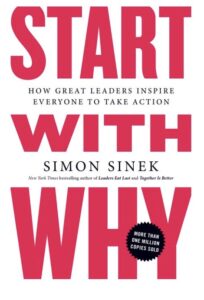
Simon Sinek
In 2009, Simon Sinek started a movement to help people become more inspired at work, and in turn inspire their colleagues and customers. Sinek starts with a fundamental question: Why are some people and organizations more innovative, more influential, and more profitable than others? Why do some command greater loyalty from customers and employees alike? Even among the successful, why are so few able to repeat their success over and over?
START WITH WHY shows that the leaders who’ve had the greatest influence in the world all think, act, and communicate the same way — and it’s the opposite of what everyone else does. Sinek calls this powerful idea The Golden Circle, and it provides a framework upon which organizations can be built, movements can be led, and people can be inspired. And it all starts with WHY.
Change, Connection and Difficult Conversations
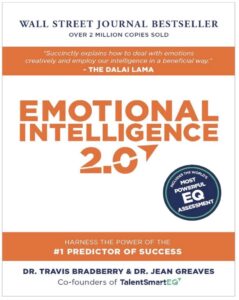
Travis Bradberry
Emotional Intelligence 2.0 delivers a step-by-step program for increasing your EQ via four, core EQ skills that enable you to achieve your fullest potential:
1) Self-Awareness
2) Self-Management
3) Social Awareness
4) Relationship Management
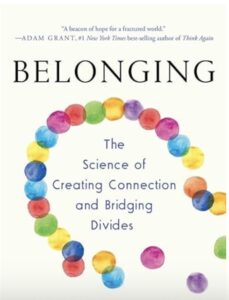
Belonging: The Science of Creating Connection and Bridging Divides
Geoffrey Cohen
Belonging is the feeling of being a part of a group that values, respects, and cares for us―a feeling that we can all cultivate in even the smallest corners of social life. Stanford University professor Geoffrey L. Cohen draws on his own and others’ groundbreaking scientific research to offer simple, concrete solutions for fostering a sense of belonging.
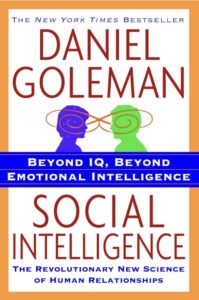
Daniel Goleman
In this book, Daniel Goleman explores an emerging new science with startling implications for our interpersonal world. Its most fundamental discovery: we are designed for sociability, constantly engaged in a “neural ballet” that connects us brain to brain with those around us.
Our reactions to others, and theirs to us, have a far-reaching biological impact, sending out cascades of hormones that regulate everything from our hearts to our immune systems, making good relationships act like vitamins—and bad relationships like poisons. We can “catch” other people’s emotions the way we catch a cold, and the consequences of isolation or relentless social stress can be life-shortening. This book argues that we have a built-in bias toward empathy, cooperation, and altruism–provided we develop the social intelligence to nurture these capacities in ourselves and others.
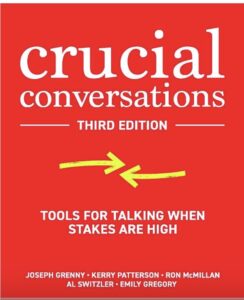
Joseph Grenny
Crucial Conversations provides powerful skills to ensure every conversation―especially difficult ones―leads to the results you want. Written in an engaging and witty style, it teaches readers how to be persuasive rather than abrasive, how to get back to productive dialogue when others blow up or clam up, and it offers powerful skills for mastering high-stakes conversations, regardless of the topic or person.
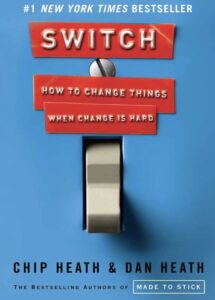
Switch: How to Change Things When Change Is Hard
Chip Heath and Dan Heath
Why is it so hard to make lasting changes in our companies, in our communities, and in our own lives? According to the authors of this book, the primary obstacle is a conflict that’s built into our brains. The rational mind wants to change something at work; the emotional mind loves the comfort of the existing routine. This tension can doom a change effort—but if it is overcome, change can come quickly.
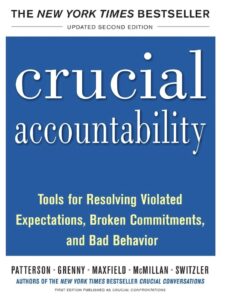
Crucial Accountability: Tools for Resolving Violated Expectations, Broken Commitments, and Bad Behavior
Kerry Patterson
Colleagues break a rule, coworkers miss a deadline, friends fail to live up to commitments (or just plain behave badly), and nobody says a word. With repeated infractions, individuals become increasingly upset until they finally do speak their minds, but they do so poorly–often creating whole new sets of problems. Crucial Accountability teaches you how to deal with violated expectations in a way that solves the problem at hand without harming the relationship–and, in fact, even strengthens it. This book offers the tools for improving relationships in the workplace and in life and for resolving all these problems–permanently.
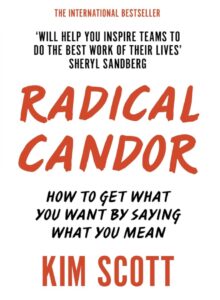
Radical Candor
Kim Scott
Radical Candor offers a guide to those bewildered or exhausted by management, written for bosses and those who manage bosses. Drawing on years of first-hand experience, and distilled clearly to give practical advice to the reader, Radical Candor shows you how to be successful while retaining your integrity and humanity. Radical Candor is the perfect handbook for those who are looking to find meaning in their job and create an environment where people love both their work and their colleagues, and are motivated to strive to ever greater success.
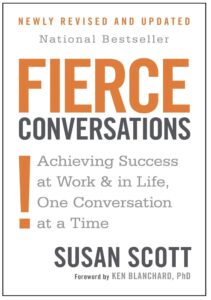
Susan Scott
The master teacher of positive change through powerful communication, Susan Scott wants you to succeed. To do that, she explains, you must transform everyday conversations at work and at home with effective ways to get your message across—and get what you want. In this guide, which includes a workbook and The Seven Principles of Fierce Conversations, she teaches you how to:
• Overcome barriers to meaningful communication
• Expand and enrich relationships with colleagues, friends, and family
• Increase clarity and improve understanding
• Handle strong emotions—on both sides of the table
• Connect with colleagues and family at a deep level
Microaggressions
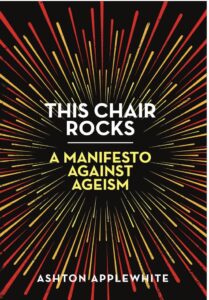
Ashton Applewhite
Explaining the roots of ageism in history and how it divides and debases, Applewhite examines how ageist stereotypes cripple the way our brains and bodies function, looks at ageism in the workplace and the bedroom, exposes the cost of the all-American myth of independence, critiques the portrayal of elders as burdens to society, describes what an all-age-friendly world would look like, and offers a rousing call to action.
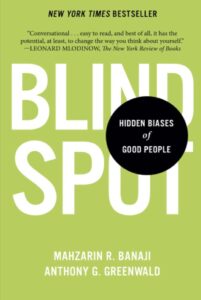
Blindspot: Hidden Biases of Good People
Mahzarin R. Banaji and Anthony Greenwald
“I know my own mind. I am able to assess others in a fair and accurate way.”
These self-perceptions are challenged by leading psychologists Mahzarin R. Banaji and Anthony G. Greenwald as they explore the hidden biases we all carry from a lifetime of exposure to cultural attitudes about age, gender, race, ethnicity, religion, social class, sexuality, disability status, and nationality. “Blindspot” is the authors’ metaphor for the portion of the mind that houses hidden biases. Writing with simplicity and verve, Banaji and Greenwald question the extent to which our perceptions of social groups—without our awareness or conscious control—shape our likes and dislikes and our judgments about people’s character, abilities, and potential.
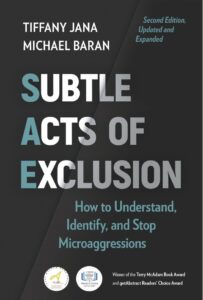
Tiffany Jana
Overt discrimination is relatively easy to spot. But the less obvious but more common actions that make people feel left out or stigmatized in our workplaces, commonly called microaggressions, can be hard to identify and even harder to deal with. The author use a clearer, more accurate term: subtle acts of exclusion (SAE). After all, people generally aren’t trying to be aggressive—usually they’re trying to say something nice, learn more about a person, or be funny. Bring accused of aggression shuts the conversation down, when you want to open it up. This book features examples, tools, sample scripts, and action plans to help readers prevent subtle acts of aggression from happening, or deal with them when they do.
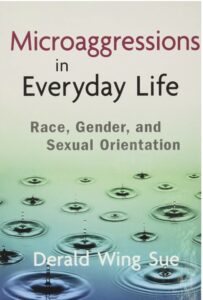
Microaggressions in Everyday Life
Derald Wing Sue
This book presents an introduction to the concept of microaggressions, classifies the various types of microaggressions, and offers solutions for ending microaggressions at the individual, group, and community levels. Subtle racism, sexism, and heterosexism remain relatively invisible and potentially harmful to the wellbeing, self-esteem, and standard of living of many marginalized groups in society. The book examines the manifestations of various forms of microaggressions and explores their impact. The text covers: researching microaggressions, exploring microaggressions in education, identifying best practices teaching about microaggressions, understanding microaggressions in the counseling setting, as well as guidelines for combating microaggressions. Each chapter concludes with a section called “The Way Forward” that provides guidelines, strategies, and interventions designed to help make our society free of microaggressions.